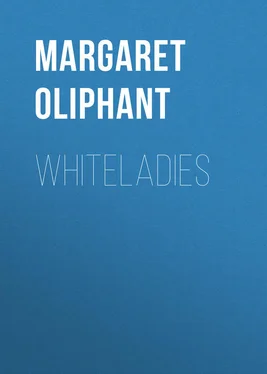Margaret Oliphant - Whiteladies
Здесь есть возможность читать онлайн «Margaret Oliphant - Whiteladies» — ознакомительный отрывок электронной книги совершенно бесплатно, а после прочтения отрывка купить полную версию. В некоторых случаях можно слушать аудио, скачать через торрент в формате fb2 и присутствует краткое содержание. ISBN: , Жанр: foreign_prose, на английском языке. Описание произведения, (предисловие) а так же отзывы посетителей доступны на портале библиотеки ЛибКат.
- Название:Whiteladies
- Автор:
- Жанр:
- Год:неизвестен
- ISBN:http://www.gutenberg.org/ebooks/52388
- Рейтинг книги:5 / 5. Голосов: 1
-
Избранное:Добавить в избранное
- Отзывы:
-
Ваша оценка:
- 100
- 1
- 2
- 3
- 4
- 5
Whiteladies: краткое содержание, описание и аннотация
Предлагаем к чтению аннотацию, описание, краткое содержание или предисловие (зависит от того, что написал сам автор книги «Whiteladies»). Если вы не нашли необходимую информацию о книге — напишите в комментариях, мы постараемся отыскать её.
Whiteladies — читать онлайн ознакомительный отрывок
Ниже представлен текст книги, разбитый по страницам. Система сохранения места последней прочитанной страницы, позволяет с удобством читать онлайн бесплатно книгу «Whiteladies», без необходимости каждый раз заново искать на чём Вы остановились. Поставьте закладку, и сможете в любой момент перейти на страницу, на которой закончили чтение.
Интервал:
Закладка:
“Here is some one coming to call,” cried Miss Susan in dismay, “and there is no one to open the door!”
“The door is open, and you can receive them here, or take them in, which you please; you don’t require any servant,” said Everard; and then he added, in a low tone, “Aunt Susan, it is the Farrel-Austins; I know their carriage.”
“Ah!” cried Miss Susan, drawing herself up. She did not say any more to him – for was not he a friend and supporter of that objectionable family? – but awaited the unwelcome visitors with dignified rigidity. Their visits to her were very rare, but she had always made a point of enduring and returning these visits with that intense politeness of hostility which transcends every other kind of politeness. She would not consent to look up, nor to watch the alighting of the brightly-clad figures on the other side of the lawn. The old front of the house, the old doorway and porch in which Miss Susan sat, was not now the formal entrance, and consequently there was no carriage road to it; so that the visitors came across the lawn with light Summer dresses and gay ribbons, flowery creatures against the background of green. They were two handsome girls, prettily dressed and smiling, with their father, a dark, insignificant, small man, coming along like a shadow in their train.
“Oh, how cool and sweet it is here!” said Kate, the eldest. “We are so glad to find you at home, Miss Austin. I think we met your sister about an hour ago going through the village. Is it safe for her to walk in the sun without her bonnet? I should think she would get a sunstroke on such a day.”
“She is the best judge,” said Miss Susan, growing suddenly red; then subduing herself as suddenly, “for my part,” she said, “I prefer the porch. It is too warm to go out.”
“Oh, we have been so much about; we have been abroad,” said Sophy, the youngest. “We think nothing of the heat here. English skies and English climate are dreadful after the climate abroad.”
“Ah, are they? I don’t know much of any other,” said Miss Susan. “Good morning, Mr. Farrel. May I show you the way to the drawing-room, as I happen to be here?”
“Oh, mayn’t we go to the hall, please, instead? We are all so fond of the hall,” said Sophy. She was the silly one, the one who said things which the others did not like to say. “ Please let us go there; isn’t this the turn to take? Oh, what a dear old house it is, with such funny passages and turnings and windings! If it were ours, I should never sit anywhere but in the hall.”
“Sophy!” said the father, in a warning tone.
“Well, papa! I am not saying anything that is wrong. I do love the old hall. Some people say it is such a tumble-down, ramshackle old house; but that is because they have no taste. If it were mine, I should always sit in the hall.”
Miss Susan led the way to it without a word. Many people thought that Sophy Farrel-Austin had reason in her madness, and said, with a show of silliness, things that were too disagreeable for the others; but that was a mere guess on the part of the public. The hall was one of the most perfectly preserved rooms of its period. The high, open roof had been ceiled, which was almost the only change made since the fifteenth century, and that had been done in Queen Anne’s time; and the huge, open chimney was partially built up, small sacrifices made to comfort by a family too tenacious of their old dwelling-place to do anything to spoil it, even at the risk of asthma or rheumatism. To tell the truth, however, there was a smaller room, of which the family now made their dining-room on ordinary occasions. Miss Susan, scorning to take any notice of words which she laid up and pondered privately to increase the bitterness of her own private sentiments toward her probable supplanters, led the way into this beautiful old hall. It was wainscoted with dark panelled wood, which shone and glistened, up to within a few feet of the roof, and the interval was filled with a long line of casement, throwing down a light which a painter would have loved upon the high, dark wall. At the upper end of the room was a deep recess, raised a step from the floor, and filled with a great window all the way up to the roof. At the lower end the musicians’ gallery of ancient days, with carved front and half-effaced coats-of-arms, was still intact. The rich old Turkey carpet on the floor, the heavy crimson curtains that hung on either side of the recess with its great window, were the most modern things in the room; and yet they were older than Miss Susan’s recollection could carry. The rest of the furniture dated much further back. The fire-place, in which great logs of wood blazed every Winter, was filled with branches of flowering shrubs, and the larger old-fashioned garden flowers, arranged in some huge blue and white China jars, which would have struck any collector with envy. Miss Susan placed her young visitors on an old, straight-backed settle, covered with stamped leather, which was extremely quaint, and very uncomfortable. She took herself one of the heavy-fringed, velvet-covered chairs, and began with deadly civility to talk. Everard placed himself against the carved mantel-piece and the bank of flowers that filled the chimney. The old room was so much the brighter to him for the presence of the girls; he did not care much that Sophy was silly. Their pretty faces and bright looks attracted the young man; perhaps he was not very wise himself. It happens so often enough.
And thus they all sat down and talked – about the beautiful weather, about the superiority, even to this beautiful weather, of the weather “abroad;” of where they had been and what they had seen; of Mrs. Farrel-Austin’s health, who was something of an invalid, and rarely came out; and other similar matters, such as are generally discussed in morning calls. Everard helped Miss Susan greatly to keep the conversation up, and carry off the visit with the ease and lightness that were desirable, but yet I am not sure that she was grateful to him. All through her mind, while she smiled and talked, there kept rising a perpetual contrast. Why were these two so bright and well, while the two children of the old house were in such sad estate? – while they chattered and laughed what might be happening elsewhere? and Everard, who had been like a brother to Herbert and Reine, laughed too, and chattered, and made himself pleasant to these two girls, and never thought – never thought! This was the sombre under-current which went through Miss Susan’s mind while she entertained her callers, not without sundry subdued passages of arms. But Miss Susan’s heart beat high, in spite of herself, when Mr. Farrel-Austin lingered behind his daughters, bidding Everard see them to the carriage.
“Cousin Susan, I should like a word with you,” he said.
CHAPTER III
The girls went out into the old corridor, leaving the great carved door of the dining-hall open behind them. The flutter of their pretty dresses filled the picturesque passage with animation, and the sound of their receding voices kept up this sentiment of life and movement even after they had disappeared. Their father looked after them well pleased, with that complacence on his countenance, and pleasant sense of personal well-being which is so natural, but so cruel and oppressive to people less well off. Miss Susan, for her part, felt it an absolute insult. It seemed to her that he had come expressly to flaunt before her his own happiness and the health and good looks of his children. She turned her back to the great window, that she might not see them going across the lawn, with Everard in close attendance upon them. A sense of desertion, by him, by happiness, by all that is bright and pleasant in the world, came into her heart, and made her defiant. When such a feeling as this gets into the soul, all softness, all indulgence to others, all favorable construction of other people’s words or ways departs. They seemed to her to have come to glory over her and over Herbert dying, and Reine mourning, and the failure of the old line. What was grief and misery to her was triumph to them. It was natural perhaps, but very bitter; curses even, if she had not been too good a woman to let them come to utterance, were in poor Miss Susan’s heart. If he had said anything to her about his girls, as she expected, if he had talked of them at all, I think the flood must have found vent somehow; but fortunately he did not do this. He waited till they were out of the house, and then rose and closed the door, and reseated himself facing her, with something more serious in his face.
Читать дальшеИнтервал:
Закладка:
Похожие книги на «Whiteladies»
Представляем Вашему вниманию похожие книги на «Whiteladies» списком для выбора. Мы отобрали схожую по названию и смыслу литературу в надежде предоставить читателям больше вариантов отыскать новые, интересные, ещё непрочитанные произведения.
Обсуждение, отзывы о книге «Whiteladies» и просто собственные мнения читателей. Оставьте ваши комментарии, напишите, что Вы думаете о произведении, его смысле или главных героях. Укажите что конкретно понравилось, а что нет, и почему Вы так считаете.












